FIDE Grand Swiss 2025: Updated dress code offers more flexibility
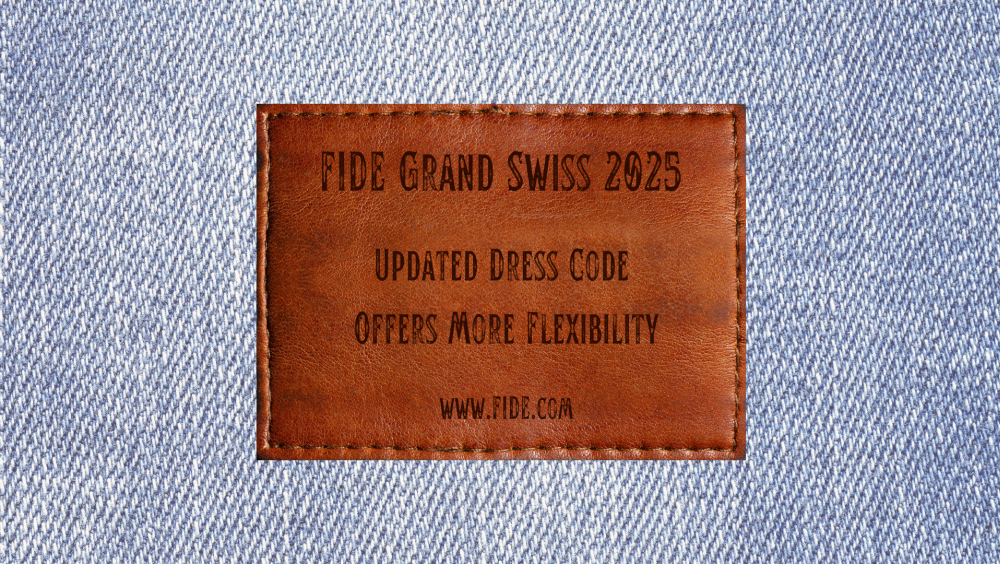
FIDE is pleased to publish the dress code for the FIDE Grand Swiss and FIDE Women’s Grand Swiss, reflecting a modern and inclusive approach while preserving the elegance of our sport. Key update Appropriate jeans are now permitted as part of the official dress code. This change offers players more comfort and freedom of choice, while ensuring that the overall appearance of the event remains professional and respectful. Dress code guidelines Men: Suit Dark business casual trousers, including classic, non-distressed jeans (blue, black, and grey) Unicoloured shirt (with minor deviations allowed, e.g. checkered or striped) Dress shoes and loafers with closed toes Unicoloured sneakers (soles can be a different colour) Women: Skirt suit, pantsuit, dress suit Dress Dark business casual trousers, including classic, non-distressed jeans (dark blue, black and grey) Shirt/blouse Dress shoes and loafers with closed toes Unicoloured sneakers (soles can be a different colour) FIDE’s perspective FIDE President Arkady Dvorkovich highlighted the spirit of the change: “FIDE took the decision to provide more flexibility in the dress code. It is still required to follow the official standards, but elegant, appropriate jeans are also allowed. FIDE, chess players, arbiters, and officials must collectively strive to preserve the integrity of chess while also ensuring that the sport remains appealing to the audience and sponsors.” With this update, FIDE reaffirms its commitment to both tradition and progress — creating an environment where players feel comfortable and confident, while the game continues to shine on the world stage.
Fujairah Global Chess: Pranav V and Sanan Sjugirov share the lead at midpoint
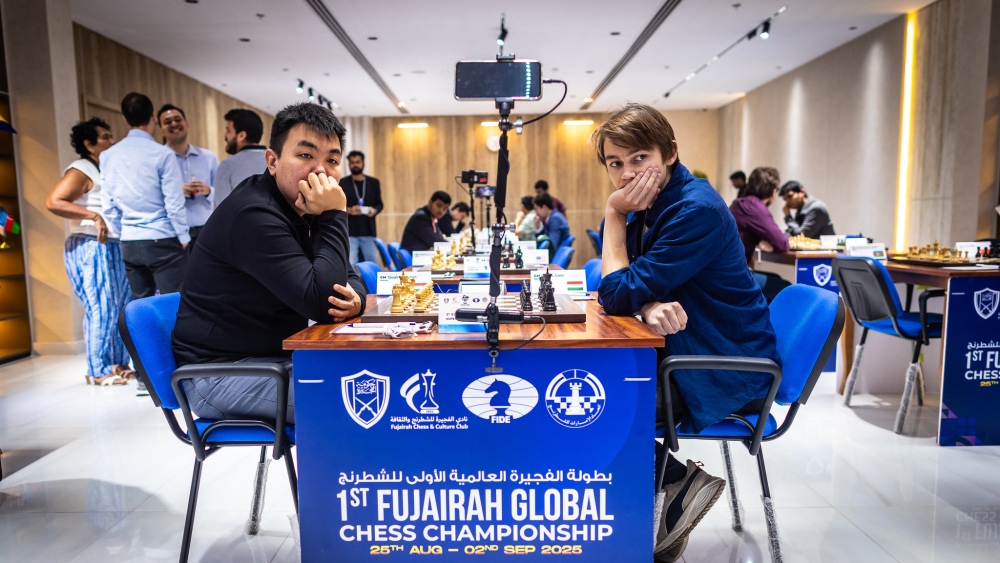
The inaugural Fujairah Global Chess Championship 2025 has passed its midpoint. After five exciting rounds, leaders have emerged in all three groups: Superstars, Masters, and Open. In the Superstars section, India’s GM Pranav V and Hungary’s GM Sanan Sjugirov are joint leaders with 4 points each. Close behind on 3.5 points are Azerbaijan’s GM Aydin Suleymanli, USA’s GMs Brandon Jacobson and Andrew Hong, China’s GM Zhu Jiner, and Iran’s GM Amin Tabatabaei. In Round 5, the top board clash between Brandon Jacobson and Amin Tabatabaei in the Queen’s Gambit Declined Exchange Variation ended in a draw. Jacobson had the upper hand for most of the game, but a mistake on move 34 in the queen endgame allowed Tabatabaei to equalize. After a series of exchanges, the game concluded in a bare-king draw after 57 moves. On Board 2, Pranav V scored an impressive victory with White against Mexico’s GM Jose Eduardo Martinez. Playing the Sicilian Rossolimo, Martinez sacrificed a pawn in the opening to damage Pranav’s pawn structure. However, the Indian maintained balance through his knight’s activity. On move 19, Martinez’s decision to open up the kingside with his f-pawn backfired. Later, in an attempt to complicate matters, he sacrificed an exchange, but Pranav demonstrated accuracy and converted the advantage smoothly, winning in 47 moves. On Board 3, Sanan Sjugirov continued his excellent run by defeating compatriot GM Gleb Dudin. Playing the Vienna Opening with White, Sanan surprised his opponent in the opening and kept a firm grip throughout the game, finally clinching victory after 51 moves. Meanwhile, on Board 4, the tournament’s only female participant, China’s GM Zhu Jiner, impressed once again. Playing Black against Aydin Suleymanli, she obtained a nearly winning position several times but missed her chances in the endgame, allowing the game to be drawn after 64 moves. On Board 5, India’s GM Raunak Sadhwani, with White, was unable to convert a winning rook endgame against USA’s GM Andrew Hong (pictured below). A crucial miscalculation by Raunak allowed Hong to escape, and the game ended in a draw. All games begin daily at 15:00 CET and are broadcast live. The tournament is conducted in full compliance with anti-cheating regulations, with all players thoroughly checked before entering the playing hall. The inaugural edition of the Fujairah Global Chess Championship attracted enormous attention worldwide — uniting over 530 participants from 70 countries. Thanks to the Fujairah Chess & Culture Club and the event sponsors, the tournament has been organized at the highest level. Superstars standings after Round 5 Masters standings after Round 5 Open standings after Round 5 Fans can follow the live broadcast of the 1st Fujairah Global Chess Championship 2025 on the Fujairah Chess and ChessBase India Hindi YouTube channels, and also check full results via Chess-Results. Written by Pavel Dvorkovich & Niklesh Jain Photos: Anna Shtourman, Vivek Sohani and Aditya Sur Roy YouTube Fujairah Chess YouTube ChessBase India Hindi Photos are available on Flickr: flickr.com/photos/203288106@N04/albums
5th Intercontinental Online Chess Championship for Prisoners: Registration continues
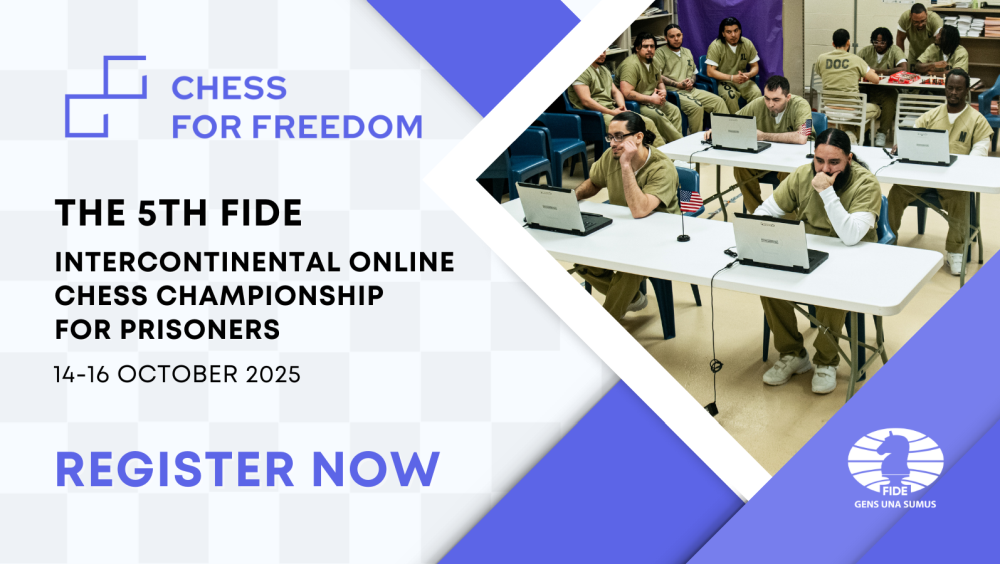
The countdown is on for the 5th edition of the FIDE Intercontinental Online Chess Championship for Prisoners, scheduled for October 14-16, 2025. Held as part of the Chess for Freedom project and the FIDE Year of Social Chess, this unique event brings correctional facilities from every continent together through the game of chess. Teams from the USA, Paraguay, Croatia, Italy, Australia, Czech Republic, Jersey, Portugal, Lithuania, Georgia, Singapore, Jamaica, Mexico, Trinidad and Tobago, Kazakhstan, UAE, Ghana, Bulgaria, Zimbabwe, and Eswatini have already confirmed their participation. With more entries expected, this year’s edition is shaping up to be truly diverse and international. Registration remains open, and correctional institutions worldwide are invited to join this global initiative. Registration Participation is free of charge Each country may enter up to three teams: men’s, women’s, and youth (under 20) Teams may include inmates from one or multiple facilities Registration deadline: September 14, 2025 Event details Platform: Chess.com Time control: 10 minutes + 5 seconds increment Group stage: October 14 Championship round: October 15 Finals: October 16 Correctional institutions can register by completing the official form and confirming their entry via email to Tournament Organizer Mikhail Korenman (mikhail.korenman@ccsheriff.org). Now in its fifth year, the Intercontinental Championship for Prisoners has become a cornerstone of the Chess for Freedom program. The tournament offers incarcerated individuals the chance to represent their institutions on the international stage, develop skills that encourage discipline and critical thinking, and connect with a wider community beyond prison walls. By promoting education, rehabilitation, and inclusion, the event continues to show the constructive role chess can play in preparing individuals for reintegration into society. FIDE looks forward to welcoming even more teams to this year’s event.
FIDE Announces final decision on the case of Kirill Shevchenko
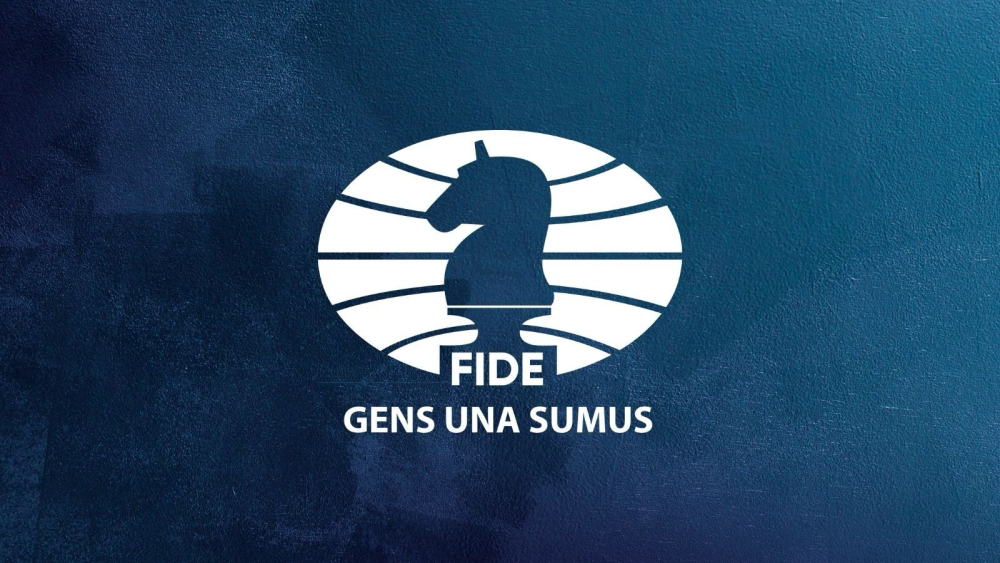
The FIDE Ethics & Disciplinary Commission (EDC), in its Appeal Chamber, has issued its final decision in Case No. 06/2024: “Alleged cheating at the Spanish Team Championship”. The appeal panel, led by Chairperson Mrs. Yolander Persaud with members Mr. Khaled Arfa and Mr. Ravindra Dongre, has strengthened the earlier sanctions imposed by the First Instance Chamber (Chaired by David Hater, together with Olga Baskakova and Alan Borda). The Chamber considered both an appeal of Kirill Shevchenko and a cross-appeal of the FIDE Fair Play Commission (FPL), dissatisfied with certain findings made by the EDC First Instance Chamber and the sanction imposed. Having considered all arguments, the Appeal Chamber has decided, by unanimity of its members, that the appeal by Kirill Shevchenko fails and the guilt is confirmed, whereas a cross-appeal of FPL succeeds and accordingly, the first-instance decision was changed as follows: Respondent GM Kirill Shevchenko, found guilty under Article 11.7(e) of the FIDE Disciplinary Code. Sanctions: A three-year worldwide ban from all FIDE-rated events. One year of the ban suspended, contingent on the absence of further misconduct. The ban runs from 19 October 2024 until 18 October 2026, with the suspended portion in effect until 18 October 2027. The Grandmaster title is revoked effective from the date of publishing this decision. Dana Reizniece, Deputy Chair of the FIDE Management Board, underlined FIDE’s firm commitment to chess integrity: “FIDE takes cheating cases among top players with the utmost seriousness. We are working hard on both prevention and swift, appropriate sanctions. Ensuring fair play is non-negotiable – it is essential to the credibility and future of our sport.” This reflects increasing efforts across FIDE divisions – including Fair Play, Arbiters, and Ethics – to strengthen detection systems, refine preventive training, and ensure swift disciplinary response when needed. The full text of the decision can be found here: ethics.fide.com/wp-content/uploads/2025/08/Case_06_2024A_decision_final.pdf
Wesley So wins 2025 Sinquefield Cup
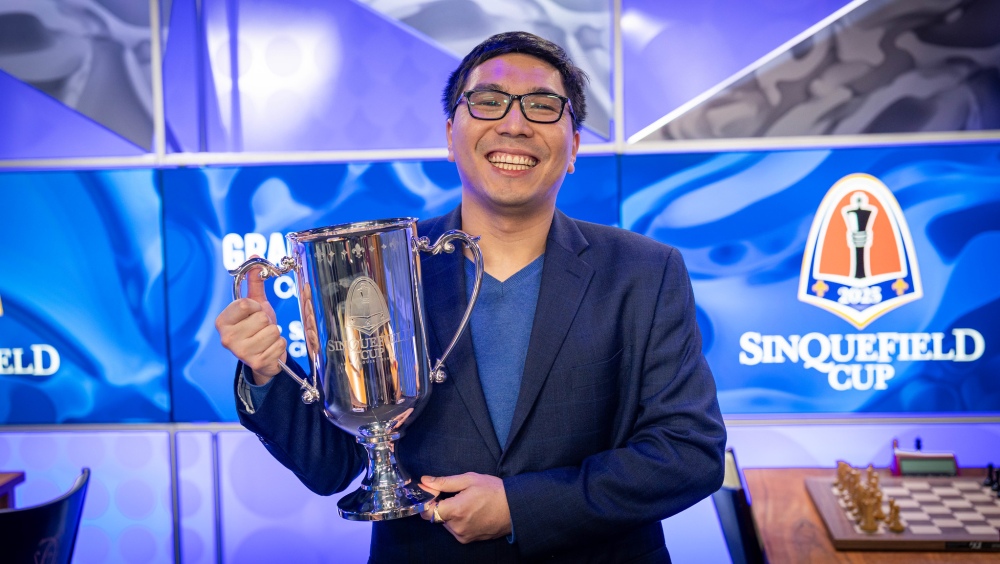
Wesley So emerged as the winner of the 2025 Sinquefield Cup, edging out Fabiano Caruana and Rameshbabu Praggnanandhaa in a dramatic blitz playoff. The American grandmaster, who was born in the Philippines, replicated his 2016 success by winning this prestigious event for the second time. The 2025 Sinquefield Cup—the final classical event and concluding leg of the Grand Chess Tour season—featured a $350,000 prize fund and took place at the World Chess Hall of Fame in St. Louis, Missouri, from August 18–28. With an exceptionally strong field, the event was fiercely contested, ending with three players tied for first place on 5.5/9. Caruana seized an early lead after scoring back-to-back wins over defending champion Alireza Firouzja and Nodirbek Abdusattorov. Praggnanandhaa, who opened his campaign with a brilliant first-round victory against World Champion Gukesh D, caught up with the leader in Round 7 after defeating Firouzja. That same round marked a turning point for So, who finally broke his streak of six straight draws by overcoming Gukesh and joining the race for first place. Heading into the final round, Caruana and Praggnanandhaa led with 5/8, closely followed by Levon Aronian and So on 4.5/8. First, Maxime Vachier-Lagrave made a quick draw with Jan-Krzysztof Duda, securing the top position in the overall GCT standings. Then Aronian, taking a pragmatic decision, split the point with Praggnanandhaa, a result that guaranteed both players spots in the 2025 GCT Finals. Caruana’s draw with Gukesh left So with a chance to force a tie for first. Rising to the occasion, So outplayed Abdusattorov, scoring a victory on demand and joining the leaders. A three-way blitz playoff was held to determine the champion. In the first game, Praggnanandhaa defeated Caruana after capitalizing on a crucial mistake by the American on move 24. In the second, So dismantled Praggnanandhaa’s queenside defense, forcing resignation. With this win, Wesley needed only a draw against Caruana to clinch the title—and he delivered, achieving this so-much-needed result after a hard-fought battle. Despite his triumph in the Sinquefield Cup, So narrowly missed qualification for the Grand Chess Tour Finals, falling short by just half a point. The Finals, featuring Maxime Vachier-Lagrave, Fabiano Caruana, Levon Aronian, and Praggnanandhaa R, and will be held from September 28 to October 3 in São Paulo, Brazil. Photos: Lennart Ootes and Crystal Fuller | Saint Louis Chess Club Official website: grandchesstour.org/
Call of interest for panels of arbiters and world events 2026-2027

Dear colleagues, International and FIDE arbiters, According to the new Regulation B.06.4 FIDE Regulations for the Appointment of Arbiters in World Events (effective from July 20th 2023), the FIDE Arbiters’ Commission is proud release a new process for the selection of arbiters in the Panels (Green, Blue, Red and Yellow) for the next cycle 2026-2027. The call of Interest for Panels of arbiters and World Events 2026-2027 is open for one month, from August 28th 2025 to September 27th 2025, 23:59 CEST for all FIDE Arbiters and International Arbiters with a valid FIDE license. All arbiters who wish to officiate in World Events have to submit their application via Chamilo* (https://arb-learn.fide.com/). * Chamilo is the ARB Training Portal, which we are using to support the process. We will take advantage of the call of interest to include colleagues who haven’t followed training sessions yet under this new system. Survey link >>> Please fill in this survey to help us identify your wishes and availability for the Panels and World Events scheduled in 2026-2027. Arbiters will be assigned according to the Regulations (B06.4), depending on their experience, to panels which will be used to assign positions in tournaments. GENS UNA SUMUS! IA Ivan SyrovyChairman FIDE Arbiters’ Commission IA Nebojsa BaralicSecretary FIDE Arbiters’ Commission
Winners crowned at the 23rd European Union Youth Chess Championship
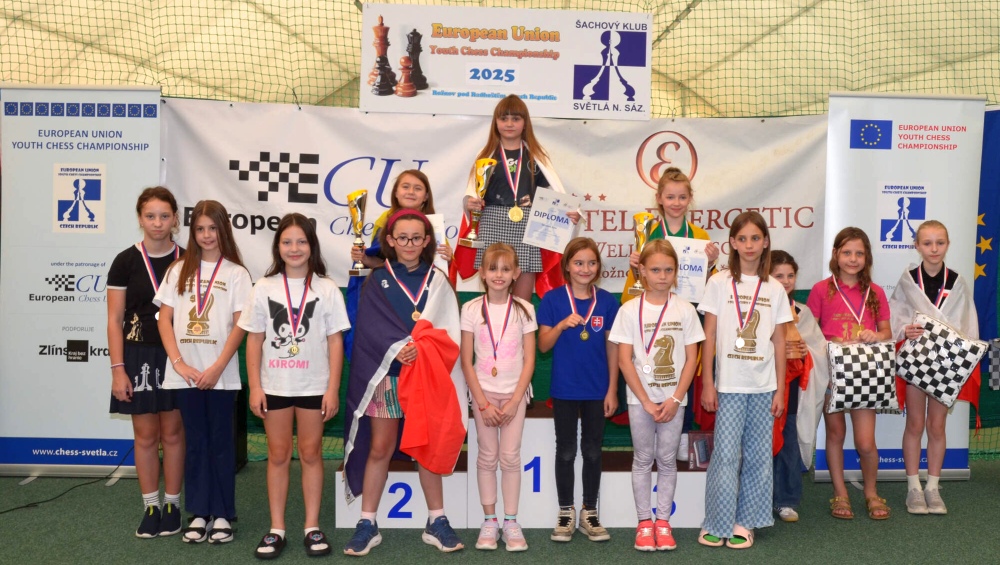
The 23rd European Union Youth Chess Championship 2025, organized by Šachový klub Světlá nad Sázavou under the patronage of the European Chess Union (ECU) and in cooperation with the Czech Chess Federation, concluded on Wednesday, August 27, in Roznov pod Radhostem. After final rounds full of fighting spirit and tension, the winners emerged in all categories: U8 Boys Lev Jevglevski (EST, 9 out of 9!) David-Christian Talaba (ROU) Daniel Sava (ROU) U8 Girls Sophia-Lenina Matala (ROU) Sare Adam (FRA) Pausader Ines Bravo (FRA) U10 Boys Filip Sirbu (FRA) Matelo Vinet (FRA) Thomas Lobina (FRA) U10 Girls Julia Szczurek (POL) Melania-Cristina Grigore (ROU) Karina Ser (LTU) U12 Boys Matvii Bilochenko (POL) Alexandru-Daniel Pasca (ROU) Krisjanis Lazars (LAT) U12 Girls Maelys Manouvel (FRA) Lila Rzadkowska (POL) Agnieszka Slusarczyk (POL) U14 Boys Andrii Diachek (POL) FM Vlad Petroff (ROU) Simon Matejka (SVK) U14 Girls Tess Hujova (CZE) Kaja Rzadkowska (POL) Olga Debowska (POL) Complete results are available HERE. The top three finishers in each category received a cup and a diploma. All participants were awarded a commemorative medal, and the eight European champions each won a laptop. The next five players in each category also received valuable prizes. Additionally, every player was given a tournament T-shirt featuring the EUYCC logo. The prizes were presented by the event director, Zdenek Fiala. The organizers also awarded special prizes for the best game in each of the final four rounds. The recipients of these brilliance awards were: Pastor Zuccolo Matteo (FRA), Melania-Cristina Grigore (ROU), Lila Rzadkowska (POL), Daniel Belocky (CZE), Sare Adam (FRA), Evienne Jongejan (NED), Klara Svabova (CZE), Kaja Rzadkowska (POL), Lev Jevglevski (EST), Julia Szczurek (POL), Alexandru-Daniel Pasca (ROU), Zsofia Bolla (HUN), Ines Bravo Pausader (FRA), Karina Ser (LTU), Yanis-Andrei Ganea (ROU), and FM Vlad Petroff (ROU). The organizers extend their gratitude to all players for their performance and fair play, to the parents and coaches for their cooperation, to the arbiters for smoothly running the tournament, and to all partners for their support. The next edition of the European Union Youth Chess Championship U8-14 will also be held in Roznov pod Radhostem from August 17 to August 26, 2026. Written by Zdenek Fiala, director Sachovy klub Svetla nad Sazavou Photo gallery: rajce.idnes.cz/sachysvetla/album/euycc-2025 Official website: chess.cz/mistrovstvi-evropske-unie/
FIDE President visits Latin America to promote chess growth
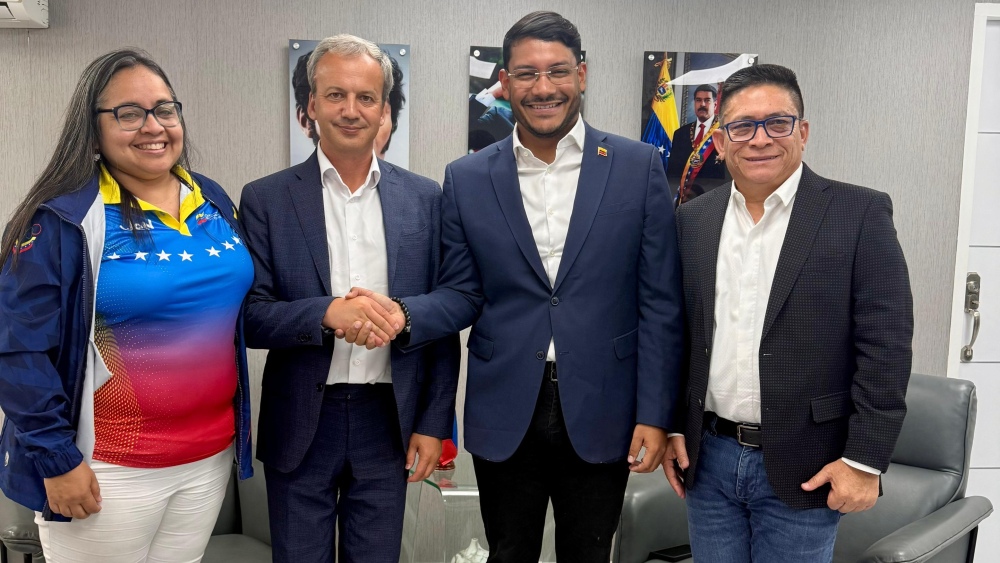
FIDE President Arkady Dvorkovich has completed a strategic tour across Latin America and the Caribbean—visiting Panama, Aruba, Curaçao, Venezuela, and Colombia—to bolster chess development in the region through strategic partnerships, education initiatives, and youth engagement. Colombia During his visit to Colombia, Arkady Dvorkovich took part in the Confederation of Chess for the Americas (CCA) assembly in Barranquilla. He witnessed the signing of a historic Memorandum of Understanding between the CCA and the Asian Chess Federation, aimed at enhancing school chess projects, youth development programs, coach and player exchanges, and educational material collaboration. He also attended the U-16 World Youth Chess Olympiad (August 16–23, 2025), where he made the first ceremonial move in a match between Georgia and the FIDE team. Reflecting on the event, he remarked: “I hope at some point we will have the Chess Olympiad in the Americas—not U-16, but the main one. It is our ambition for the future. Having more events here allows local players to improve their skills and gain valuable experience.” Panama FIDE President met with Luis Esquivel (President, Panama Chess Federation), Miguel Ordóñez (Director General, Pandeportes), and José Carrillo Pujol (President, Confederation of Chess for the Americas). They had a productive discussion on expanding school chess programs, organizing international events, and enhancing training opportunities, with plans for closer collaboration between FIDE and the Chess Federation of Panama. Aruba In Aruba, he met with Gerlien Croes (Minister of Kingdom Relations, Education, Youth, Innovation & Sports). Alongside FIDE Executive Director, GM Victor Bologan, he opened a mini chess tournament at Centro di Bario Dakota, engaged with young players, and joined a friendly football match—highlighting chess as a tool for community development. Curaçao In Curaçao, Arkady Dvorkovich held a formal meeting with Sithree van Heydoorn (Minister of Education, Science, Culture & Sport), Christine Dania (President, Curaçao Olympic Committee), Vergilly Winklar (Director, Foundation for Development of Sports), and Paulus Berkenveld (President, Curaçao Chess Federation). Discussions focused on establishing chess among Curaçao’s top five sports and introducing Chess in Schools. GM Bologan also gave a simultaneous exhibition for local players to promote grassroots participation. Venezuela In Venezuela, FIDE President met with Rander Peña (Deputy Minister for Latin America, Ministry of Foreign Affairs), Hugo Martín (President, Venezuelan Chess Federation), Alejandro López (Vice Minister of Education), Johann Carlos Álvarez Márquez (Vice Minister of Foreign Trade and Investment Promotion), and Jose Manuel Suarez Maldonado (Mayor, Vargas Municipality). The discussions centered on strengthening professional and social chess, hosting international events, and scaling up the Chess in Schools program through joint initiatives. Reflecting on the tour, FIDE President said: “Visits like these are vital for the global chess community. They connect us with players, officials, and educators while supporting federations in bringing chess to schools, communities, and families. The passion I witnessed confirms that chess is more than a sport—it is a tool for education, social development, and international friendship.”
Fujairah Global Chess: World Junior Champion Pranav V stuns top seed Nihal Sarin
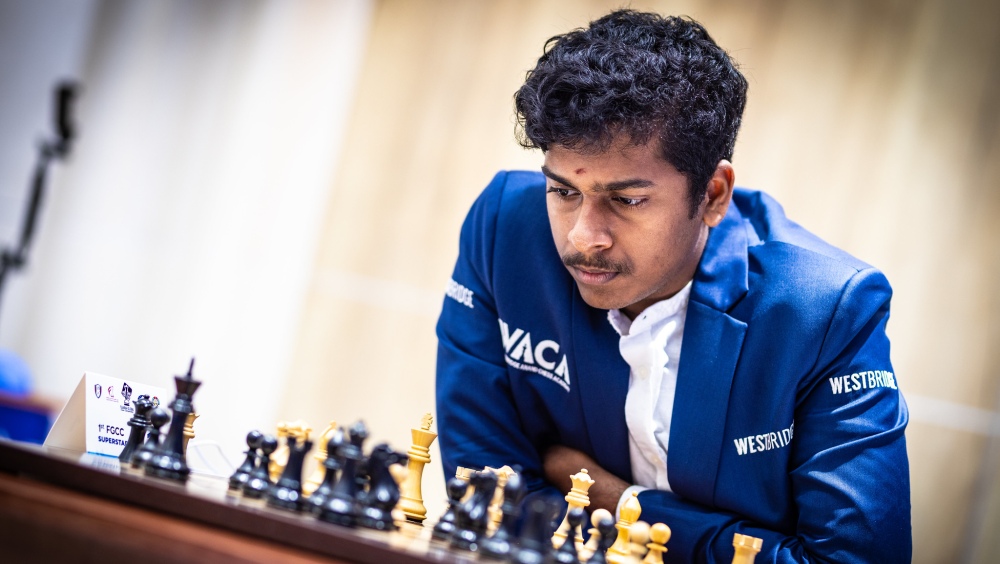
The inaugural Fujairah Global 2025 tournament began with a sensational upset as India’s reigning World Junior Champion, GM Pranav Venkatesh, defeated top seed and recent Asian Individual silver medalist, compatriot GM Nihal Sarin. Playing Black in the Sicilian, Nihal soon found himself under mounting pressure. Limited with space, his pieces struggled to find activity. On move 29, his bishop became trapped near Pranav’s king, shifting the balance decisively. Although Nihal was given a chance to bounce back after Pranav’s slip on move 45, he missed this opportunity, ultimately resigning after a long 71-move battle. For Nihal, who is close to the 2700 rating mark, the loss was a major setback, and he appeared visibly dejected after the game. Just last week, Nihal defeated Pranav at the Chennai Grandmasters, but this time Pranav took sweet revenge by leveling the score. Opening Ceremony & Participation Yesterday, the city of Fujairah, UAE, hosted the opening and the first round of the 1st Fujairah Global Chess Championship 2025. With 71 countries and over 530 participants across three sections — Superstars with 44 players, Masters with 239 players, and Open with 250 players — the championship promises top-level action filled with excitement and unexpected results throughout. Special guests from the UAE Chess Federation, Fujairah Chess & Culture Club, and the Qatar Chess Federation attended the opening, reaffirming international support for the growth of chess in the UAE and underlining the global importance of the event. Dr. Abdullah Ali Al Barak T, President of the Fujairah Chess & Culture Club, and Mohamed Al-Mudahka, President of the Qatar Chess Federation, made the first ceremonial moves to officially launch the competition in all three sections. The UAE Chess Federation extended its gratitude to all partners and organizations that made the tournament possible — especially the sponsors, whose support has been instrumental in organizing such a grand event. Fans can follow the games live on the Fujairah Chess and ChessBase India Hindi YouTube channels, as well as track results on Chess-Results. Surprises on Day 1 The Superstars event features 44 elite players with an impressive average rating of 2606. The opening round saw several big surprises: Second seed GM Raunak Sadhwani was held to a draw by FIDE’s GM Aleksey Grebnev. Third seed GM Amin Tabatabaei suffered a shock defeat against Romanian GM Alexander Motylev (pictured below). India’s GM S L Narayanan drew with USA’s GM Sam Shankland. GM Pranav Anand held UAE’s top star, GM Salem Saleh. GM Pranesh M split the point with Mexico’s GM Jose Martinez Alcantara Meanwhile, Hungary’s GM Sanan Sjugirov defeated compatriot GM Adam Kozak to start with a full point. The first-round upsets were so striking that ninth seed Sjugirov now finds himself on Board 1 for Round 2, 12th seed Cheparinov – on Board 2, and 18th seed Abhimanyu Mishra – on Board 3. In fact, among the top 18 players, as many as 15 either lost or were held to draws — a clear indication of how fiercely competitive this section is. The tournament boasts a total prize fund of US$ 125,000, with US$ 80,000 allotted to the Superstars section, US$ 30,000 to the Masters (2200–2599), and US$ 15,000 to the Open (<2200). The top three prizes in the Superstars are $23,000, $13,000, and $9,000 respectively. Masters section The Masters is itself a very strong Grandmaster tournament. On the top board, USA’s GM Vladimir Akopian received a walkover to get himself on the scoreboard. On Board 2, India’s reigning National Champion, GM Karthik Venkataraman, started his campaign with a win against compatriot FM Garv Gaur. On Board 3, Turkey’s GM Sanal Vahap defeated India’s Namitbir Singh Walia to secure his first victory. The Masters section has attracted 202 players, while the Open section has nearly 290 participants. Altogether, the three categories feature 533 players from 71 countries, making Fujairah Global a truly international celebration of chess. Written by Pavel Dvorkovich & Niklesh Jain Photos: Aditya Sur Roy, Anna Shtourman and IA Vivek Sohani Photo gallery: flickr.com/photos/203288106@N04/albums/ Broadcast: youtube.com/watch?v=k6u0lv3DjrU Results are available HERE
FIDE World Cup 2025 heads to Goa, India
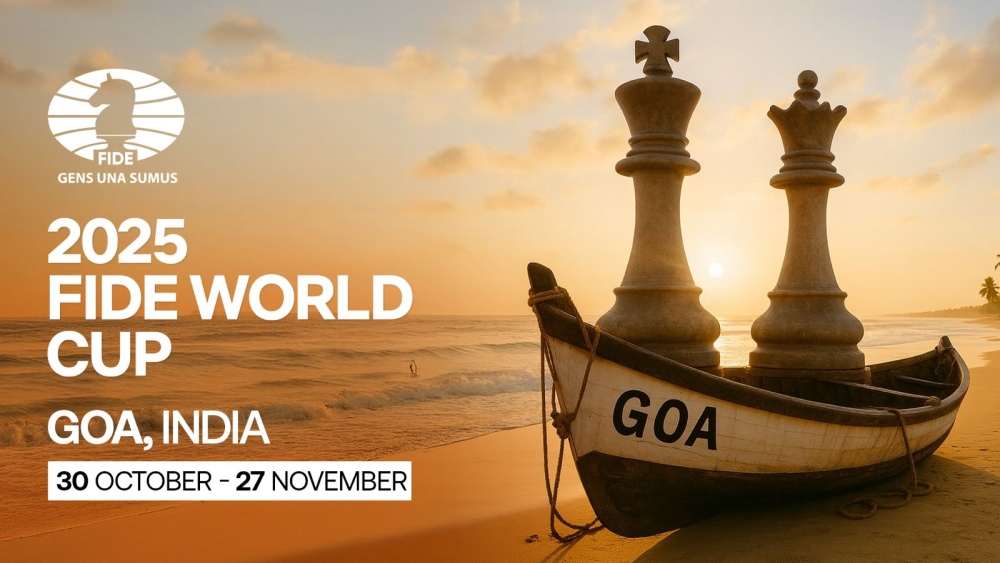
The FIDE World Cup 2025 is coming to Goa! From October 30 to November 27, 2025, the world’s top players will gather on India’s west coast for one of the most exciting chess events. This knockout spectacle brings together 206 players fighting for a share of USD 2,000,000 and three coveted places in the 2026 Candidates Tournament. Every round is win-or-go-home, making the World Cup one of the most dramatic tournaments on the calendar. Why Goa? Goa’s stunning beaches, vibrant culture, and warm hospitality makes it an exciting backdrop for this global showdown. Players and fans will experience world-class chess alongside a destination famous for its energy and charm. India’s connection to chess runs deep, and in recent years the country has become a global force, producing top players and hosting significant tournaments. Last year, Gukesh Dommaraju became the World Champion, whilst Indian teams won the Chess Olympiad in both Open and Women categories. The momentum continued: this July, the Women’s World Cup saw a standout performance by Divya Deshmukh, who lifted the trophy and captured worldwide attention. Staging the Open World Cup in Goa builds on these successes and gives local fans an opportunity to watch their stars compete against the very best on home soil. Arkady Dvorkovich, FIDE President: “India has become one of the strongest chess nations, with outstanding players and passionate fans. After the success of the FIDE Women’s World Cup held in Georgia earlier this year, we are proud to bring the FIDE World Cup to Goa. It will be a celebration of chess, and a unique experience for players and spectators from around the world. The representatives of 90+ countries are expected to take part, and it will be one of the most followed events in chess history.” Narendra Modi, Prime Minister of India: “India is delighted to be hosting the prestigious FIDE World Cup 2025 and that too after over two decades. Chess is gaining popularity among our youth. I am sure this tournament will witness thrilling matches and showcase the brilliance of top players from around the world.” Nitin Narang, AICF President: “This is a proud moment for Indian chess, and we are committed to delivering an event that reflects both the passion of our fans and the professionalism of our federation. The World Cup will not only inspire millions across the country but also showcase India’s growing stature as a global hub for chess. We are deeply thankful to FIDE for granting India the honor of hosting the World Cup 2025 in Goa.” Key Details Dates: 31 October to 27 November 2025 Venue: Goa, India Players: 206 Format: Eight-round knockout Top 50 seeds enter from Round 2 Matches are two classical games, with rapid and blitz playoffs if tied Candidates spots: Top three finishers qualify for the 2026 Candidates Tournament List of qualified players: worldcup2025.fide.com/participants/ Regulations for FIDE World Cup 2025 (PDF) With Goa confirmed as the host city, anticipation is building for an unforgettable month of high-stakes chess. Stay tuned for more information. The countdown to the FIDE World Cup 2025 has officially begun!

